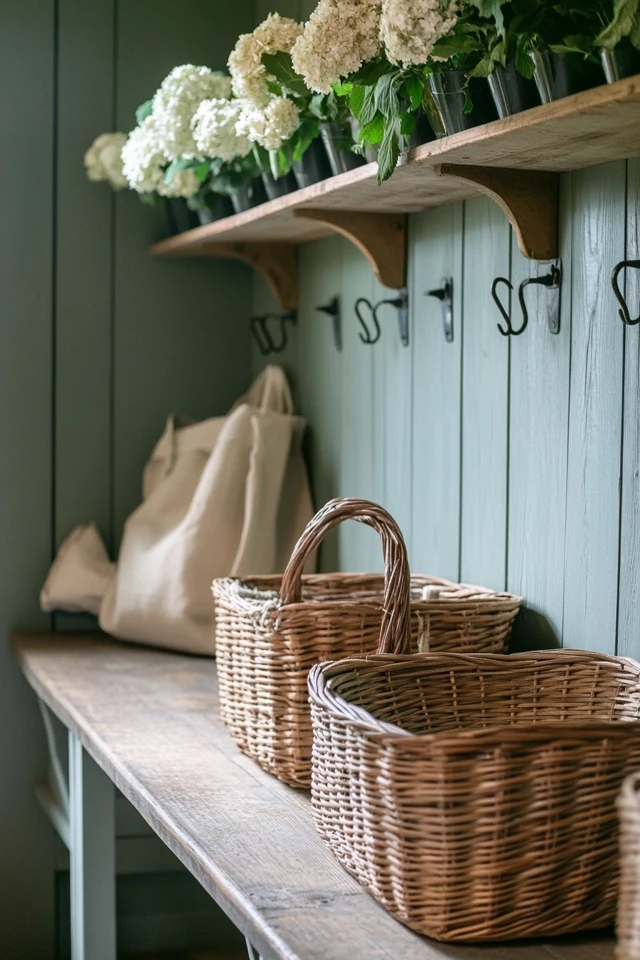The mudroom is one of the hardest-working spaces in any home, especially for busy households. As a transition zone between the outdoors and indoors, it needs to be practical, organized, and durable. However, it doesn’t have to sacrifice style. A farmhouse mudroom can be the perfect blend of function and charm, with rustic details and thoughtful storage solutions that keep your home tidy and welcoming.
When I designed my own farmhouse mudroom, I realized how much it simplified my daily routine. With hooks for coats, cubbies for shoes, and a cozy bench for slipping on boots, it quickly became one of my favorite spots in the house. Plus, the warm wood tones and vintage accents gave it a look that matched the rest of my farmhouse-style home.
In this guide, I’ll share step-by-step tips for creating a functional farmhouse mudroom that keeps clutter at bay while adding character to your home.
Why a Farmhouse Mudroom is a Game-Changer
1. It Keeps Your Home Clean and Organized
A well-designed mudroom serves as a drop zone for shoes, bags, and outdoor gear, preventing clutter from spreading into other rooms.
2. It’s Durable and Practical
Farmhouse mudrooms often feature sturdy materials like wood, metal, and tile that can handle heavy use.
3. It Adds Charm to Your Home
Rustic details like shiplap walls, wooden benches, and woven baskets give your mudroom a warm and inviting look.
1. Start with a Durable Floor
The flooring in a mudroom needs to withstand muddy boots, wet umbrellas, and heavy foot traffic.
- Best Materials: Tile, stone, or waterproof vinyl planks are excellent options for farmhouse mudrooms.
- Patterns: Consider wood-look tiles or herringbone patterns for a rustic yet stylish touch.
- Why It Works: Durable flooring is easy to clean and adds a polished look to the space.
Pro Tip: Add a washable area rug or runner to soften the look and catch dirt.
2. Incorporate Built-In Storage
Storage is the backbone of any functional mudroom.
- Cubbies: Create individual cubbies for each family member to store shoes, bags, and hats.
- Hooks: Install sturdy hooks for coats, scarves, and backpacks.
- Overhead Shelves: Use upper shelves for seasonal items like gloves, hats, and umbrellas.
Why It Works: Built-in storage keeps items organized and prevents clutter from piling up.
Pro Tip: Label each cubby or basket to ensure everything has its place.
3. Add a Farmhouse-Style Bench
A bench is a must-have for any mudroom, offering a convenient spot to sit while putting on shoes.
- Materials: Choose a wooden or reclaimed wood bench for a rustic look.
- Storage Options: Use a bench with built-in drawers or open space underneath for additional shoe storage.
- Why It Works: A bench combines practicality with charm, making your mudroom feel welcoming.
Pro Tip: Add a few throw pillows in neutral tones or ticking stripe patterns to soften the look.
4. Use Shiplap or Beadboard Walls
Shiplap or beadboard adds texture and farmhouse charm to your mudroom walls.
- Paint Colors: Stick to classic farmhouse shades like white, gray, or soft beige.
- Durability: These materials protect your walls from scuffs and scratches, especially in high-traffic areas.
- Why It Works: Shiplap and beadboard create a cozy, rustic backdrop that’s easy to clean.
Pro Tip: Use semi-gloss paint for easy wipe-downs and a polished finish.
5. Include Woven Baskets for Extra Storage
Baskets are a farmhouse staple and a great way to organize smaller items.
- What to Store: Use baskets for gloves, scarves, pet leashes, or cleaning supplies.
- Styles: Choose woven or wire baskets with rustic finishes.
- Why It Works: Baskets add texture while keeping clutter out of sight.
Pro Tip: Use baskets with handles for easy access and portability.
6. Add a Peg Rail for Versatility
A peg rail is a simple yet functional feature that’s perfect for a farmhouse mudroom.
- How to Use: Hang jackets, hats, tote bags, or even decorative wreaths.
- Materials: Opt for wood with a natural or painted finish.
- Why It Works: Peg rails provide a stylish way to keep frequently used items within reach.
Pro Tip: Install a ledge above the peg rail for additional storage or display space.
7. Incorporate a Sink or Pet Washing Station
A mudroom is the perfect spot for a small utility sink or pet washing station.
- Sink Materials: Choose a farmhouse sink in porcelain or stainless steel for a rustic yet functional look.
- Pet Washing Area: Install a tiled area with a handheld sprayer for rinsing off muddy paws.
- Why It Works: A sink or pet station helps keep messes contained and your floors clean.
Pro Tip: Use the sink area for gardening tasks or cleaning outdoor gear as well.
8. Use Lighting to Set the Mood
Lighting is often overlooked in mudrooms but plays a big role in the overall design.
- Fixtures: Choose barn-style sconces, industrial pendant lights, or vintage-inspired lanterns.
- Why It Works: The right lighting adds warmth and makes the space feel inviting.
Pro Tip: Use dimmable bulbs to adjust the ambiance as needed.
9. Add Decorative Touches
Farmhouse mudrooms don’t have to be purely utilitarian—decorative elements can make the space feel more personal.
- Wall Art: Hang a vintage sign with phrases like “Welcome” or “Farm Fresh.”
- Greenery: Add potted plants, a small wreath, or faux greenery for a fresh touch.
- Seasonal Décor: Swap out decorations based on the season, like pumpkins in the fall or garlands in the winter.
Why It Works: These details make the mudroom feel like a cohesive part of your home.
10. Create a Drop Zone for Keys and Mail
A small drop zone helps keep daily essentials organized.
- Hooks and Trays: Add hooks for keys and a tray or basket for mail.
- Wall-Mounted Organizers: Use a chalkboard or bulletin board for schedules, reminders, and notes.
- Why It Works: A drop zone ensures that everything has its place, reducing morning chaos.
Pro Tip: Choose organizers in natural wood or metal finishes to match the farmhouse aesthetic.
Picture Gallery
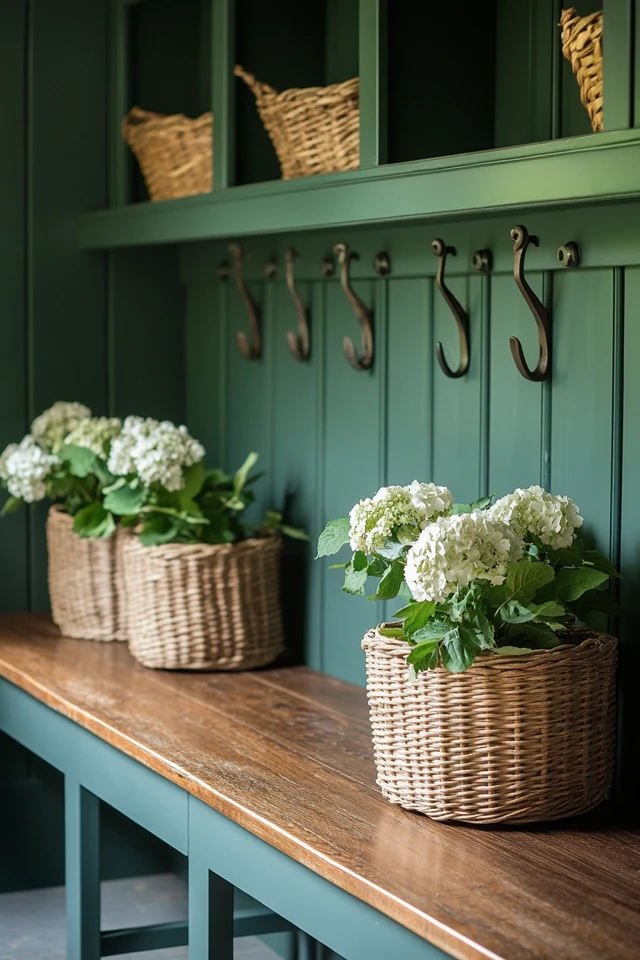
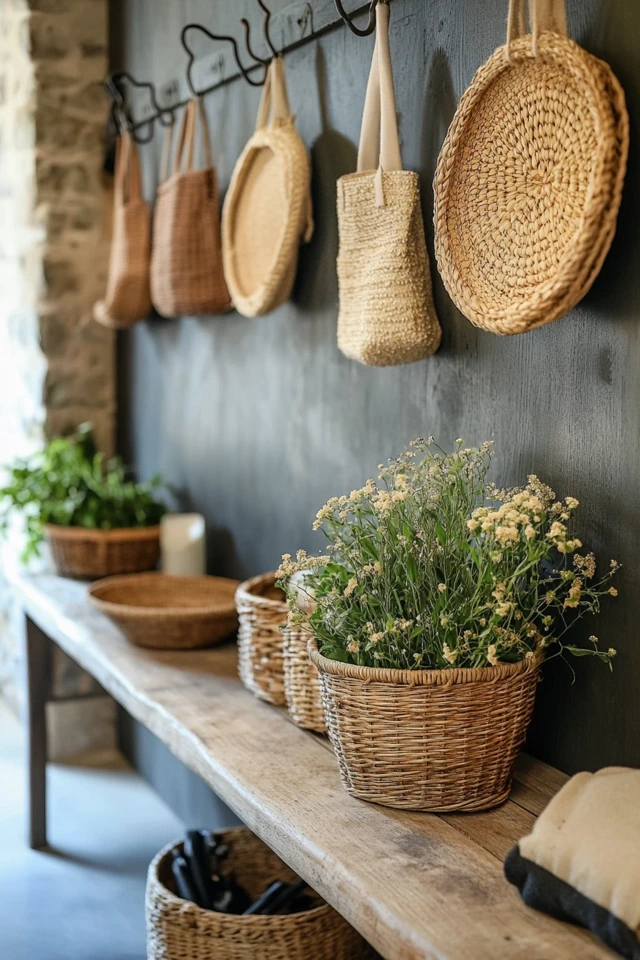

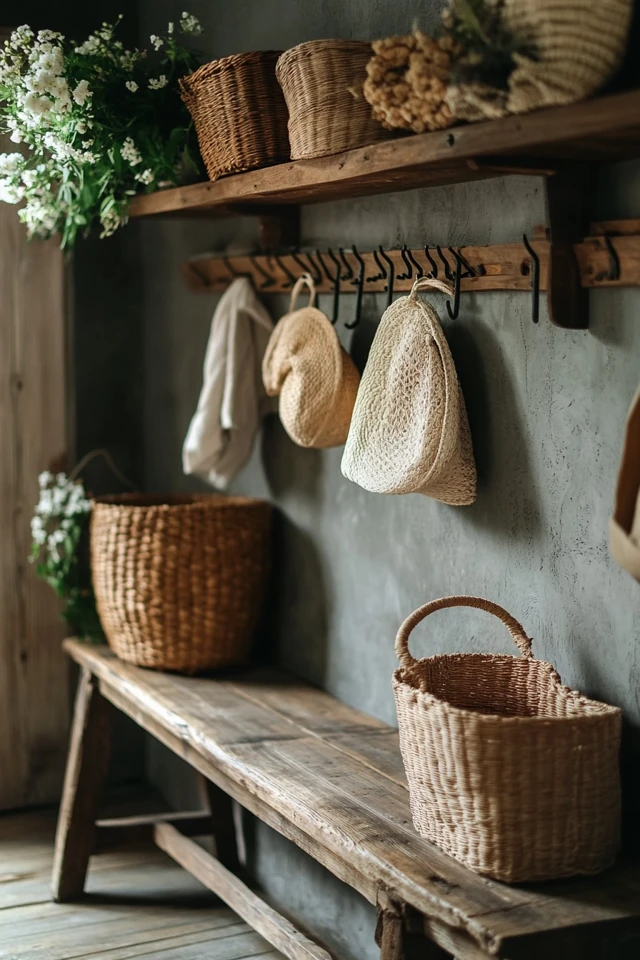
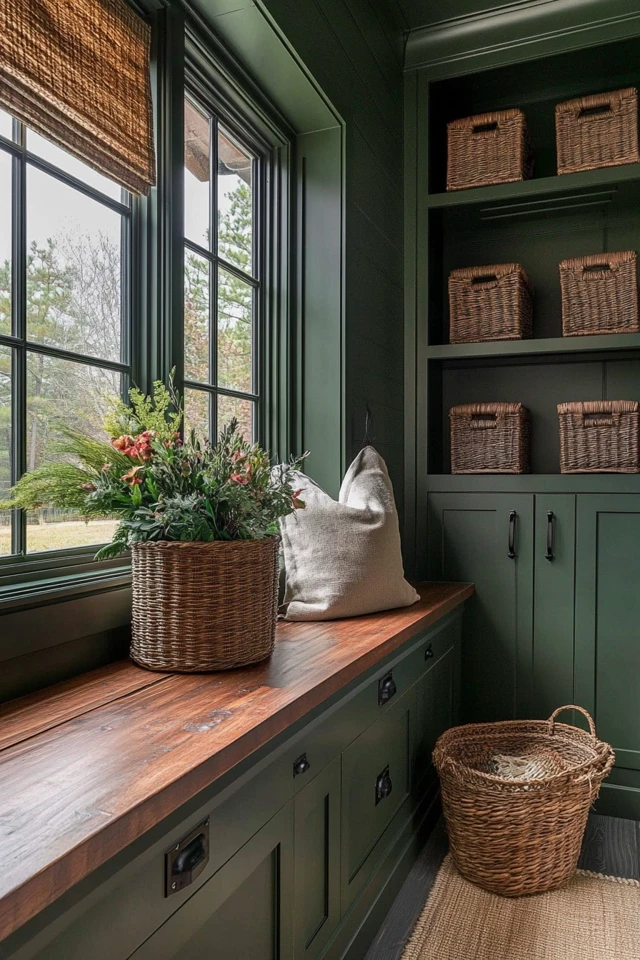
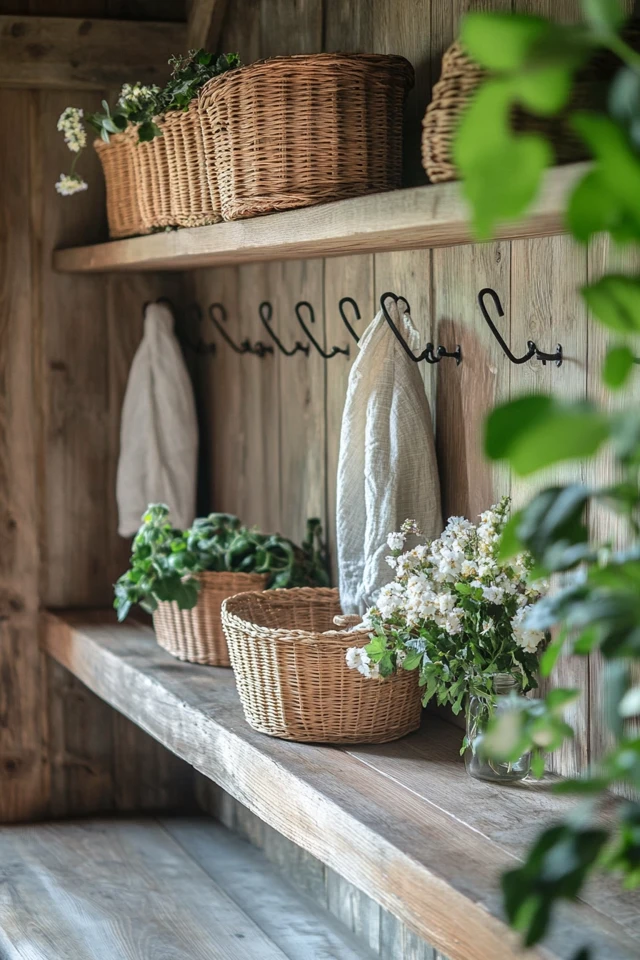
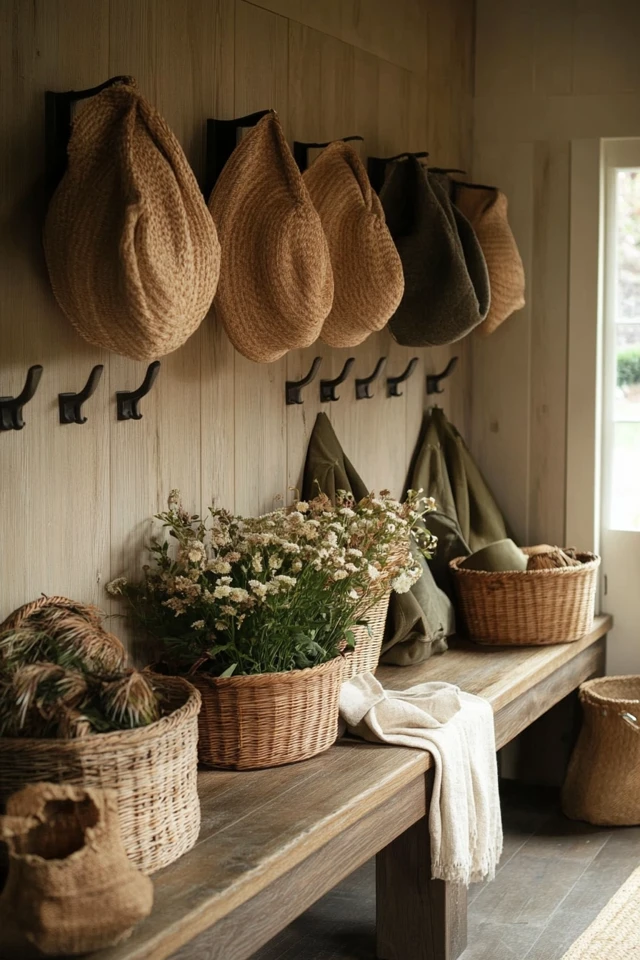
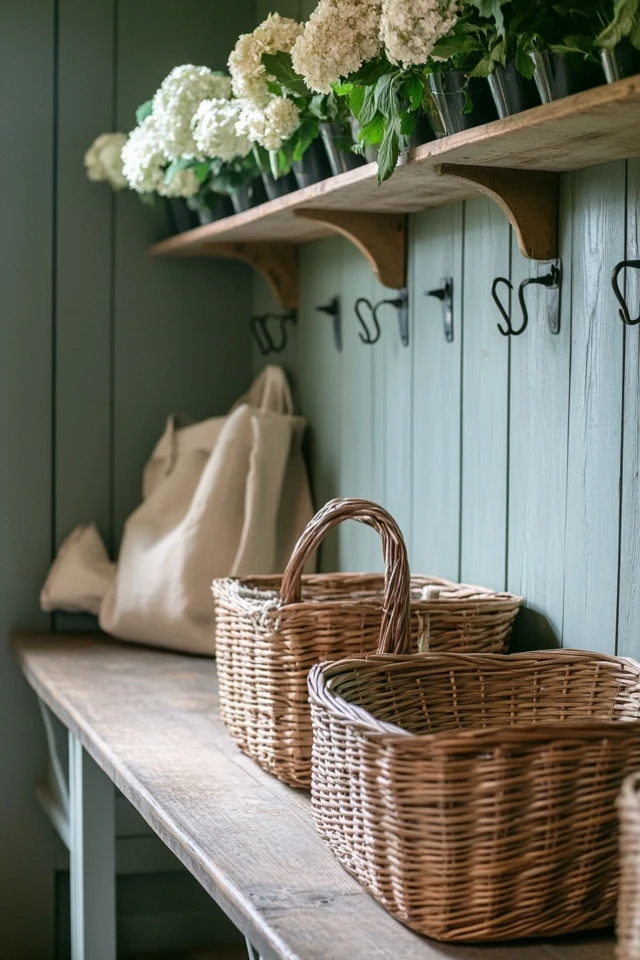
Tips for Designing a Farmhouse Mudroom
- Prioritize Functionality: Focus on features like storage, seating, and durable finishes that can handle daily wear and tear.
- Stick to a Cohesive Style: Use natural materials like wood, metal, and wicker to maintain a farmhouse look.
- Optimize Small Spaces: Utilize vertical storage, peg rails, and multi-functional furniture to maximize every square inch.
- Keep It Tidy: Incorporate labeled baskets and designated storage areas to prevent clutter from accumulating.
Conclusion
A farmhouse mudroom is more than just a practical space—it’s an opportunity to add charm and functionality to your home. With thoughtful design elements like shiplap walls, wooden benches, and plenty of storage, you can create a mudroom that works hard while looking beautiful.
By blending rustic details with smart organization, you’ll have a mudroom that keeps your home clean, organized, and full of farmhouse character. Whether you’re tackling muddy boots or corralling kids’ backpacks, this hardworking space will quickly become one of the most essential parts of your home.
FAQs
1. What’s the best flooring for a farmhouse mudroom?
Durable options like tile, stone, or waterproof vinyl are ideal for handling mud, water, and heavy foot traffic.
2. How do I organize a small mudroom?
Maximize space with vertical storage, hooks, and multi-functional furniture like benches with built-in cubbies.
3. Can I add a farmhouse mudroom to an existing entryway?
Yes! Add features like a bench, hooks, and storage baskets to create a functional mudroom in any entryway.
4. How do I keep my mudroom clean?
Use washable rugs, baskets for clutter, and a utility sink or pet washing station to contain messes.
5. What colors work best for a farmhouse mudroom?
Neutral tones like white, gray, beige, or soft greens are perfect for creating a clean, inviting farmhouse aesthetic.

